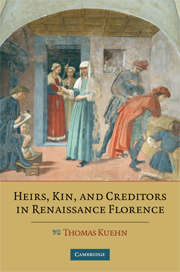Book contents
- Frontmatter
- Contents
- List of Tables
- Preface: The Ambivalence of Inheritance
- Introduction: Of Inheritance and Kinship
- 1 Family and Inheritance
- 2 Florentine Laws Regulating Inheritance and Repudiation
- 3 Repudiation and Inheritance
- 4 Profile of Florentine Repudiation and Inheritance
- 5 Repudiations and Household Wealth
- 6 Repudiation as an Inheritance Practice
- 7 Repudiations in Dispute
- Conclusion
- Appendix 1
- Appendix 2
- Appendix 3
- Appendix 4
- Appendix 5
- Appendix 6
- Sources and Abbreviations
- Index
3 - Repudiation and Inheritance
Published online by Cambridge University Press: 17 August 2009
- Frontmatter
- Contents
- List of Tables
- Preface: The Ambivalence of Inheritance
- Introduction: Of Inheritance and Kinship
- 1 Family and Inheritance
- 2 Florentine Laws Regulating Inheritance and Repudiation
- 3 Repudiation and Inheritance
- 4 Profile of Florentine Repudiation and Inheritance
- 5 Repudiations and Household Wealth
- 6 Repudiation as an Inheritance Practice
- 7 Repudiations in Dispute
- Conclusion
- Appendix 1
- Appendix 2
- Appendix 3
- Appendix 4
- Appendix 5
- Appendix 6
- Sources and Abbreviations
- Index
Summary
Inheritance in Florentine Family Records
Florentine sons knew that their futures depended in large part on what their fathers left them – not just houses, lands, and other tangible assets, but kinship and patronage connections, political rights and business opportunities, and the elusive sense of esteem and status captured in terms such as onore, onestà, vergogna, or fama that graced so much of Florentine discourse. For their part, daughters too knew that their dowries (which were generally, if not strictly so in legal terms, their inheritance share) set their futures as wives or as nuns, as did those same social ties and qualities their brothers looked to. In the poorer families, there was less to expect on the death of one's parents, less to bind the generations to each other. Still, for them too inheritance could be important.
In comparison to other Italian communities, notably in contrast to Venice, Florence went to an extreme to emphasize the masculine and patrilinear (agnatic) nature of kinship in inheritance. That linearity left Florentine women with, formally, a more restricted sphere of legal agency, while it also obscured their role in the transmission of lineage identity. Thus, ties of neighborhood and patronage figured more obviously in Florentines' self-constructions than did the useful ties with cognatic kin, about which Venetians seem to have been more open. Mechanisms of linear inheritance, and means to avoid them (namely repudiation), may well have carried more meaning and utility in Florence than many other communities.
- Type
- Chapter
- Information
- Heirs, Kin, and Creditors in Renaissance Florence , pp. 82 - 111Publisher: Cambridge University PressPrint publication year: 2008



